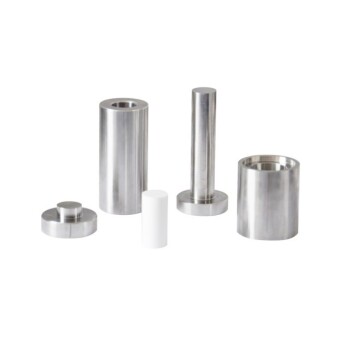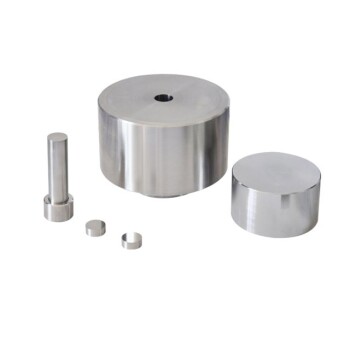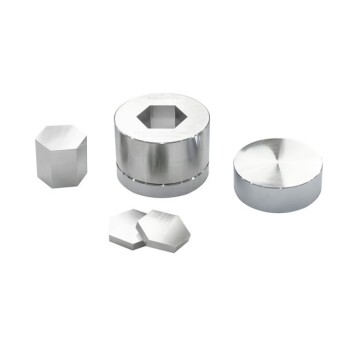Beyond the rubber industry, laboratory presses are fundamental tools used across a vast range of sectors for their ability to apply precise force and temperature in a controlled environment. Key industries include pharmaceuticals, plastics and composites manufacturing, laminating for products like credit cards, aerospace, medical device development, and ceramics. Their use is critical for research and development, material testing, and specialized, small-scale production runs.
The core reason a laboratory press is so widely adopted is its function as a miniature, high-precision factory. It allows researchers and manufacturers to test new materials, validate production processes, and create prototypes at a small scale before committing to expensive, large-scale industrial equipment.

The Core Function: Precision Under Pressure
A laboratory press is designed to do one thing exceptionally well: apply a specific amount of force (and often, heat) to a material within a defined space. This simple function is the foundation for a multitude of critical industrial applications.
Research and Development (R&D)
Nearly every industry that creates physical products uses lab presses for R&D. They allow scientists to mix and mold new formulations of polymers, composites, or pharmaceutical compounds to test their viability and characteristics.
This small-scale environment is perfect for iterating on new ideas without the waste and expense of using a full production line.
Quality Control and Material Testing
Consistency and reliability are non-negotiable in manufacturing. Presses are used to prepare material samples for quality control testing.
For example, a plastic resin might be pressed into a standardized shape to test its tensile strength, or mineral powders can be compacted into a dense pellet for X-ray fluorescence (XRF) analysis.
Prototyping and Small-Scale Production
For high-value or highly customized items, a lab press can serve as the entire production machine. This is common for prototyping new parts, lean manufacturing cells, and short production runs.
This approach avoids the massive capital investment of dedicated industrial machinery, making it ideal for niche products or initial market testing.
Key Industries and Applications
While the function is consistent, the specific applications vary significantly by industry, showcasing the press's versatility.
Pharmaceuticals and Medical
In the pharmaceutical industry, presses are essential for compacting powders into tablets or pellets for testing drug delivery and formulation consistency.
In the medical field, they are used to develop and mold specialized components from medical-grade polymers, silicones, and composites.
Plastics, Polymers, and Composites
This is a primary application area. Presses are used to mold plastic test plaques, cure composite materials for aerospace and automotive parts, and form thermoplastic resins into specific shapes. The precise control over heat and pressure is critical for achieving desired material properties.
Laminating
The creation of credit cards, ID cards, and security badges is a classic example of lamination with a laboratory press. Multiple layers of plastic and printed material are fused together under heat and pressure to create a durable, single card.
Wood, Ceramics, and Textiles
In wood science, presses are used to create experimental plywood and particleboard samples. In ceramics, they compress fine powders into "green" forms before firing in a kiln.
Even the textile industry uses presses to test the effects of heat and pressure on different fabrics and dyes.
Understanding the Trade-offs and Advantages
The decision to use a laboratory press is driven by a clear set of advantages that align with specific goals, but it's important to understand its limitations.
Advantage: Unmatched Precision
A lab press offers granular control over pressure, temperature, and cycle time. This level of precision is impossible to achieve on large-scale equipment and is essential for valid scientific testing and developing sensitive materials.
Advantage: Scalability and Process Validation
A process perfected on a lab press can often be scaled up to full production. This makes the press a crucial tool for de-risking investment, as it validates a manufacturing process before millions are spent on industrial machinery.
Limitation: Low Throughput
The primary trade-off is volume. A laboratory press is, by design, not meant for mass production. Its cycle times are longer and its platen size is smaller than industrial alternatives, making it inefficient for high-volume manufacturing.
Advantage: Versatility and Cost-Effectiveness
A single press can be used with a huge variety of materials and molds. For a research lab or a company producing small batches, this versatility makes it a highly cost-effective asset compared to purchasing specialized machinery for each task.
Making the Right Choice for Your Goal
To determine if a laboratory press is the right tool, you must align its capabilities with your primary objective.
- If your primary focus is material research and development: The press is an indispensable tool for creating and testing new material formulations with scientific accuracy.
- If your primary focus is quality assurance: Use a press to create consistent, repeatable samples for material validation and to ensure production batches meet quality standards.
- If your primary focus is niche or prototype manufacturing: The press is a cost-effective solution for low-volume production of high-value parts, such as in aerospace or medical device prototyping.
Ultimately, the laboratory press serves as a cornerstone of material innovation, enabling progress across any industry that relies on transforming raw materials into finished goods.
Summary Table:
| Industry | Key Applications |
|---|---|
| Pharmaceuticals | Tablet compaction, drug formulation testing |
| Plastics & Composites | Molding test plaques, curing materials |
| Aerospace | Prototyping parts, material validation |
| Medical Devices | Developing components from polymers |
| Laminating | Creating credit cards, ID badges |
| Ceramics | Compressing powders into forms before firing |
| Wood Science | Making experimental plywood samples |
| Textiles | Testing fabric heat and pressure effects |
Unlock the full potential of your laboratory with KINTEK's precision lab press machines! Whether you're in pharmaceuticals, plastics, aerospace, or another industry, our automatic lab presses, isostatic presses, and heated lab presses deliver unmatched control for R&D, quality testing, and small-scale production. Enhance your material innovation and efficiency—contact us today to discuss how we can support your specific needs and drive your projects forward!
Visual Guide

Related Products
- Laboratory Hydraulic Press 2T Lab Pellet Press for KBR FTIR
- Automatic Laboratory Hydraulic Press Lab Pellet Press Machine
- Laboratory Hydraulic Press Lab Pellet Press Button Battery Press
- Laboratory Hydraulic Press Lab Pellet Press Machine for Glove Box
- Manual Heated Hydraulic Lab Press with Integrated Hot Plates Hydraulic Press Machine
People Also Ask
- How is a laboratory hydraulic press used for polymer melt crystallization? Achieve Flawless Sample Standardization
- How are hydraulic presses used in spectroscopy and compositional determination? Enhance Accuracy in FTIR and XRF Analysis
- What are some laboratory applications of hydraulic presses? Boost Precision in Sample Prep and Testing
- How do hydraulic press machines ensure precision and consistency in pressure application? Achieve Reliable Force Control for Your Lab
- What role does a high-pressure laboratory hydraulic press play in KBr pellet preparation? Optimize FTIR Accuracy



















